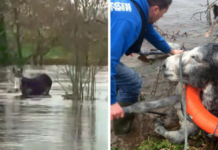On a British beach, a six-year-old digging for shark teeth discovered a four-inch long megalodon tooth that had been buried for at least three million years.
Sammy Shelton discovered the tooth with his father Peter on Bawdsey Beach in Gorleston-on-Sea, Suffolk; it’s a popular place for tourists looking for shells, sharks’ teeth, and fossils from recent and distant ages.
Despite the fact that megalodon teeth have been found practically everywhere on Earth, semi-professional fossil hunters with trowels and knee pads for kneeling in the mud told the father and son that finding megalodon teeth in Great Britain is nearly unheard of.
“Sammy was very excited as we’d seen fragments of shark teeth on the beach, but nothing as big and heavy as this,” Mr. Shelton said, also stating that the young boy has grown “very attached to it” and even takes it to bed with him.
“Now that Sammy has found this it has really piqued his interest in paleontology and he took it to school to show his class,” Mr. Shelton said.
Megalodon didn’t live alongside the dinosaurs, but evolved as the Earth recovered from the cataclysm that wiped them out. They were three times the size of a great white shark, had the most powerful bite of any land or sea animal ever known, and swam the seas between 23 and 3 million years ago.
Nobody can eat you like the megalodon can with such a gigantic body. But with a diet consisting of species as large as whales, it’s existence was highly dependant on the presence of similarly massive marine creatures, a status quo that will never persist forever, as Earth’s history shows.
Megalodon went extinct not just because of its position at the top of the food chain, but also because of its enormous distribution, with its 60 ton, 18 meter-long bulk proliferating all of the world’s seas save Antarctica’s.
Ben Garrod, a TV scientist and author, shared little Sammy’s delight, as the tooth was so well kept that the enamel inside was visible. Garrod stated that he had searched for megalodon teeth his entire life but had never found one, and that only two or three are discovered in Britain each year—and they’re usually severely corroded.













